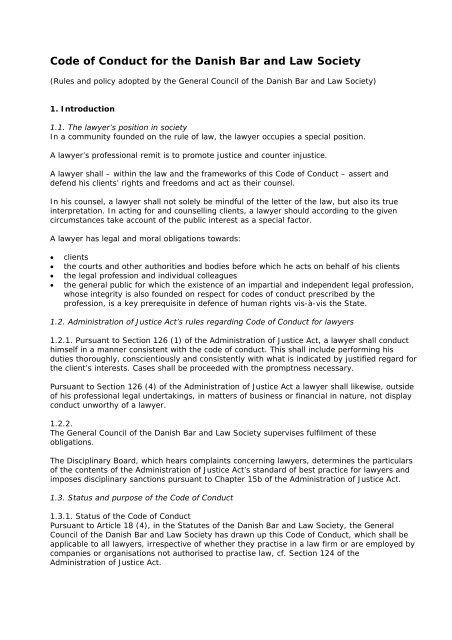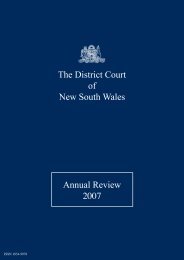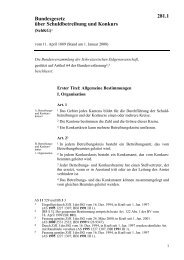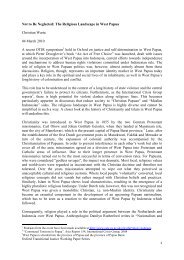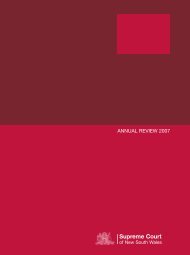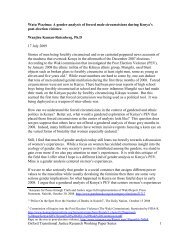Code of Conduct for the Danish Bar and Law Society
Code of Conduct for the Danish Bar and Law Society
Code of Conduct for the Danish Bar and Law Society
Create successful ePaper yourself
Turn your PDF publications into a flip-book with our unique Google optimized e-Paper software.
<strong>Code</strong> <strong>of</strong> <strong>Conduct</strong> <strong>for</strong> <strong>the</strong> <strong>Danish</strong> <strong>Bar</strong> <strong>and</strong> <strong>Law</strong> <strong>Society</strong><br />
(Rules <strong>and</strong> policy adopted by <strong>the</strong> General Council <strong>of</strong> <strong>the</strong> <strong>Danish</strong> <strong>Bar</strong> <strong>and</strong> <strong>Law</strong> <strong>Society</strong>)<br />
1. Introduction<br />
1.1. The lawyer’s position in society<br />
In a community founded on <strong>the</strong> rule <strong>of</strong> law, <strong>the</strong> lawyer occupies a special position.<br />
A lawyer’s pr<strong>of</strong>essional remit is to promote justice <strong>and</strong> counter injustice.<br />
A lawyer shall – within <strong>the</strong> law <strong>and</strong> <strong>the</strong> frameworks <strong>of</strong> this <strong>Code</strong> <strong>of</strong> <strong>Conduct</strong> – assert <strong>and</strong><br />
defend his clients’ rights <strong>and</strong> freedoms <strong>and</strong> act as <strong>the</strong>ir counsel.<br />
In his counsel, a lawyer shall not solely be mindful <strong>of</strong> <strong>the</strong> letter <strong>of</strong> <strong>the</strong> law, but also its true<br />
interpretation. In acting <strong>for</strong> <strong>and</strong> counselling clients, a lawyer should according to <strong>the</strong> given<br />
circumstances take account <strong>of</strong> <strong>the</strong> public interest as a special factor.<br />
A lawyer has legal <strong>and</strong> moral obligations towards:<br />
• clients<br />
• <strong>the</strong> courts <strong>and</strong> o<strong>the</strong>r authorities <strong>and</strong> bodies be<strong>for</strong>e which he acts on behalf <strong>of</strong> his clients<br />
• <strong>the</strong> legal pr<strong>of</strong>ession <strong>and</strong> individual colleagues<br />
• <strong>the</strong> general public <strong>for</strong> which <strong>the</strong> existence <strong>of</strong> an impartial <strong>and</strong> independent legal pr<strong>of</strong>ession,<br />
whose integrity is also founded on respect <strong>for</strong> codes <strong>of</strong> conduct prescribed by <strong>the</strong><br />
pr<strong>of</strong>ession, is a key prerequisite in defence <strong>of</strong> human rights vis-à-vis <strong>the</strong> State.<br />
1.2. Administration <strong>of</strong> Justice Act’s rules regarding <strong>Code</strong> <strong>of</strong> <strong>Conduct</strong> <strong>for</strong> lawyers<br />
1.2.1. Pursuant to Section 126 (1) <strong>of</strong> <strong>the</strong> Administration <strong>of</strong> Justice Act, a lawyer shall conduct<br />
himself in a manner consistent with <strong>the</strong> code <strong>of</strong> conduct. This shall include per<strong>for</strong>ming his<br />
duties thoroughly, conscientiously <strong>and</strong> consistently with what is indicated by justified regard <strong>for</strong><br />
<strong>the</strong> client’s interests. Cases shall be proceeded with <strong>the</strong> promptness necessary.<br />
Pursuant to Section 126 (4) <strong>of</strong> <strong>the</strong> Administration <strong>of</strong> Justice Act a lawyer shall likewise, outside<br />
<strong>of</strong> his pr<strong>of</strong>essional legal undertakings, in matters <strong>of</strong> business or financial in nature, not display<br />
conduct unworthy <strong>of</strong> a lawyer.<br />
1.2.2.<br />
The General Council <strong>of</strong> <strong>the</strong> <strong>Danish</strong> <strong>Bar</strong> <strong>and</strong> <strong>Law</strong> <strong>Society</strong> supervises fulfilment <strong>of</strong> <strong>the</strong>se<br />
obligations.<br />
The Disciplinary Board, which hears complaints concerning lawyers, determines <strong>the</strong> particulars<br />
<strong>of</strong> <strong>the</strong> contents <strong>of</strong> <strong>the</strong> Administration <strong>of</strong> Justice Act’s st<strong>and</strong>ard <strong>of</strong> best practice <strong>for</strong> lawyers <strong>and</strong><br />
imposes disciplinary sanctions pursuant to Chapter 15b <strong>of</strong> <strong>the</strong> Administration <strong>of</strong> Justice Act.<br />
1.3. Status <strong>and</strong> purpose <strong>of</strong> <strong>the</strong> <strong>Code</strong> <strong>of</strong> <strong>Conduct</strong><br />
1.3.1. Status <strong>of</strong> <strong>the</strong> <strong>Code</strong> <strong>of</strong> <strong>Conduct</strong><br />
Pursuant to Article 18 (4), in <strong>the</strong> Statutes <strong>of</strong> <strong>the</strong> <strong>Danish</strong> <strong>Bar</strong> <strong>and</strong> <strong>Law</strong> <strong>Society</strong>, <strong>the</strong> General<br />
Council <strong>of</strong> <strong>the</strong> <strong>Danish</strong> <strong>Bar</strong> <strong>and</strong> <strong>Law</strong> <strong>Society</strong> has drawn up this <strong>Code</strong> <strong>of</strong> <strong>Conduct</strong>, which shall be<br />
applicable to all lawyers, irrespective <strong>of</strong> whe<strong>the</strong>r <strong>the</strong>y practise in a law firm or are employed by<br />
companies or organisations not authorised to practise law, cf. Section 124 <strong>of</strong> <strong>the</strong><br />
Administration <strong>of</strong> Justice Act.
The <strong>Code</strong> <strong>of</strong> <strong>Conduct</strong> expresses <strong>the</strong> <strong>Danish</strong> legal pr<strong>of</strong>ession’s underst<strong>and</strong>ing <strong>of</strong> <strong>the</strong><br />
requirements <strong>for</strong> <strong>the</strong> pr<strong>of</strong>essional st<strong>and</strong>ards <strong>and</strong> ethics to be observed by lawyers in practising<br />
law.<br />
This underst<strong>and</strong>ing <strong>of</strong> <strong>the</strong> fundamental ethical principles <strong>for</strong> practising law is essentially<br />
universal <strong>for</strong> <strong>the</strong> legal pr<strong>of</strong>ession in all EU Member States – <strong>and</strong> in all democratic states<br />
governed by law. The <strong>Code</strong> <strong>of</strong> <strong>Conduct</strong> is <strong>the</strong>re<strong>for</strong>e extensively based on <strong>the</strong> <strong>Code</strong> adopted by<br />
<strong>the</strong> CCBE (Council <strong>of</strong> <strong>Bar</strong>s <strong>and</strong> <strong>Law</strong> Societies <strong>of</strong> Europe) governing cross-border legal services<br />
within <strong>the</strong> EU.<br />
1.3.2. Purpose <strong>of</strong> <strong>the</strong> <strong>Code</strong><br />
This <strong>Code</strong> <strong>of</strong> <strong>Conduct</strong> shall serve as a guide <strong>for</strong> lawyers, <strong>the</strong>ir clients <strong>and</strong> <strong>the</strong> general public<br />
with regard to <strong>the</strong> duties <strong>of</strong> a pr<strong>of</strong>essional ethical nature that are incumbent on lawyers in<br />
practising law.<br />
The purpose <strong>of</strong> <strong>the</strong> <strong>Code</strong> <strong>of</strong> <strong>Conduct</strong> is fur<strong>the</strong>r to contribute to <strong>the</strong> Disciplinary Board’s<br />
prescriptions <strong>for</strong> <strong>the</strong> Administration <strong>of</strong> Justice Act’s st<strong>and</strong>ard <strong>of</strong> <strong>Code</strong> <strong>of</strong> <strong>Conduct</strong>.<br />
1.4. Applicability <strong>of</strong> <strong>the</strong> <strong>Code</strong> <strong>of</strong> <strong>Conduct</strong><br />
1.4.1.<br />
The following rules are applicable to lawyers practising in Denmark <strong>and</strong> <strong>Danish</strong> lawyers<br />
practising abroad.<br />
1.4.2.<br />
The <strong>Code</strong> <strong>of</strong> <strong>Conduct</strong> <strong>for</strong> <strong>Law</strong>yers in <strong>the</strong> European Union adopted by <strong>the</strong> CCBE, <strong>and</strong> ratified by<br />
<strong>the</strong> General Council <strong>of</strong> <strong>the</strong> <strong>Danish</strong> <strong>Bar</strong> <strong>and</strong> <strong>Law</strong> <strong>Society</strong> shall likewise apply to <strong>the</strong> cross-border<br />
activities <strong>of</strong> lawyers within <strong>the</strong> EU.<br />
2. General principles<br />
2.1.1. Independence<br />
In practising law, a lawyer shall at all times preserve his absolute independence. A<br />
lawyer must thus not allow himself to be influenced by ei<strong>the</strong>r his own or third parties’<br />
ulterior interests.<br />
A lawyer must not compromise his pr<strong>of</strong>essional st<strong>and</strong>ards in order to please his client,<br />
<strong>the</strong> court or third parties.<br />
2.1.2.<br />
Rescinded.<br />
2.2. Trust <strong>and</strong> personal integrity<br />
A lawyer shall by maintaining his personal honour <strong>and</strong> integrity at all times strive to preserve<br />
his clients’ trust.<br />
2.3. Confidentiality<br />
2.3.1.<br />
Trust <strong>and</strong> confidentiality between <strong>the</strong> lawyer <strong>and</strong> his client is a necessary precondition <strong>for</strong><br />
<strong>the</strong> lawyer’s function.<br />
Discretion is <strong>the</strong>re<strong>for</strong>e essentially a legal <strong>and</strong> ethical duty <strong>and</strong> right <strong>for</strong> lawyers <strong>and</strong> shall be<br />
respected in <strong>the</strong> interests not only <strong>of</strong> <strong>the</strong> individual but also society at large.<br />
2
2.3.2.<br />
A lawyer shall respect <strong>the</strong> confidentiality <strong>of</strong> all in<strong>for</strong>mation that becomes known to him in<br />
<strong>the</strong> course <strong>of</strong> his pr<strong>of</strong>essional activity.<br />
2.3.3.<br />
The obligation <strong>of</strong> confidentiality is not limited in time.<br />
2.3.4.<br />
Rescinded.<br />
2.3.5.<br />
The lawyer’s associates, staff <strong>and</strong> o<strong>the</strong>r persons employed in <strong>the</strong> law firm shall fulfil <strong>the</strong><br />
same obligation <strong>of</strong> confidentiality.<br />
2.3.6.<br />
If several lawyers or law firms conduct business in joint <strong>of</strong>fices, 2.3.5 shall likewise apply<br />
to such joint <strong>of</strong>fices.<br />
2.4. Collaboration <strong>and</strong> relations with o<strong>the</strong>r pr<strong>of</strong>essions<br />
2.4.1.<br />
A lawyer may not practise his pr<strong>of</strong>ession in a partnership or similar <strong>for</strong>m <strong>of</strong> financial joint<br />
venture with individuals or companies who are not authorised to practise law, cf. Section<br />
124 <strong>of</strong> <strong>the</strong> Administration <strong>of</strong> Justice Act.<br />
2.5. Publicity etc.<br />
2.5.1. Advertising<br />
Advertising must not contain inaccurate, misleading or unreasonably deficient<br />
statements.<br />
2.5.2. Company name<br />
2.5.2.1.<br />
The company name <strong>of</strong> a law firm must be suitable <strong>for</strong> unique <strong>and</strong> specific identification <strong>of</strong><br />
that firm.<br />
2.5.2.2.<br />
The company name <strong>and</strong> extensions to it shall indicate that <strong>the</strong> enterprise is a law firm.<br />
Limited liability law firms shall moreover observe Section 124 (1) <strong>of</strong> <strong>the</strong> Administration <strong>of</strong><br />
Justice Act.<br />
2.5.2.3.<br />
The company name <strong>and</strong> o<strong>the</strong>r business trademarks, including logos, <strong>of</strong> a law firm must<br />
not be designed to give <strong>the</strong> impression that <strong>the</strong> firm is operated by parties o<strong>the</strong>r than<br />
lawyers, cf. Section 124 <strong>of</strong> <strong>the</strong> Administration <strong>of</strong> Justice Act.<br />
2.6. Legal stationery<br />
2.6.1.<br />
Stationery used by lawyers must con<strong>for</strong>m to <strong>the</strong> rules set out in 2.5.<br />
3
2.6.2.<br />
If stationery bears <strong>the</strong> names <strong>of</strong> persons o<strong>the</strong>r than <strong>the</strong> lawyers engaged in <strong>the</strong> law firm, this<br />
must be in such a manner as to indicate –e.g. by separation or o<strong>the</strong>r clear indication<br />
– that such persons are not responsible participants in <strong>the</strong> firm, cf. Section 124 <strong>of</strong> <strong>the</strong><br />
Administration <strong>of</strong> Justice Act.<br />
2.6.3<br />
If authorization <strong>for</strong> <strong>the</strong> <strong>Danish</strong> courts are indicated, this shall be by means <strong>of</strong> <strong>the</strong> <strong>of</strong>ficially<br />
designated title or commonly used abbreviation <strong>and</strong> cited immediately after <strong>the</strong> <strong>Bar</strong><br />
member’s name.<br />
3. Relations with clients<br />
3.1. Acceptance <strong>and</strong> h<strong>and</strong>ling <strong>of</strong>, <strong>and</strong> withdrawal from, cases<br />
3.1.1. Acceptance <strong>of</strong> cases<br />
3.1.1.1.<br />
A lawyer may solely accept a case <strong>for</strong> a client on <strong>the</strong> direct instructions <strong>of</strong> that client,<br />
from ano<strong>the</strong>r lawyer on behalf <strong>of</strong> that client or on <strong>the</strong> instructions <strong>of</strong> a public authority or<br />
from an o<strong>the</strong>rwise competent body.<br />
3.1.1.2.<br />
If <strong>the</strong> specific circumstances indicate that <strong>the</strong> identity, competence <strong>and</strong> authority <strong>of</strong> <strong>the</strong><br />
client are uncertain, <strong>the</strong> lawyer should make reasonable ef<strong>for</strong>ts to obtain in<strong>for</strong>mation as<br />
to <strong>the</strong>se matters.<br />
3.1.1.3.<br />
A lawyer must not receive money from, per<strong>for</strong>m or assist in per<strong>for</strong>ming monetary<br />
transactions <strong>for</strong> any party except as part <strong>of</strong> his per<strong>for</strong>mance <strong>of</strong> an assignment <strong>for</strong> a client<br />
whose identity is known to him.<br />
3.1.1.4.<br />
If a lawyer in connection with a client’s request <strong>for</strong> counsel has grounds to suspect that<br />
<strong>the</strong> client’s purpose is to misuse <strong>the</strong> lawyer’s counsel <strong>for</strong> <strong>the</strong> purposes <strong>of</strong> punishable acts<br />
or omissions, including money-laundering, <strong>the</strong> lawyer must not accept <strong>the</strong> assignment.<br />
The same applies if h<strong>and</strong>ling <strong>the</strong> case would entail breach <strong>of</strong> code <strong>of</strong> conduct, c.f. Section<br />
126 <strong>of</strong> <strong>the</strong> Administration <strong>of</strong> Justice Act.<br />
3.1.1.5.<br />
In accepting any new case, <strong>the</strong> lawyer shall make every ef<strong>for</strong>t to guard himself against<br />
any doubts as to his observance <strong>of</strong> <strong>the</strong> provisions in 3.2 concerning conflict <strong>of</strong> interests.<br />
3.1.2. H<strong>and</strong>ling <strong>of</strong> cases<br />
3.1.2.1.<br />
A lawyer shall serve <strong>the</strong> client’s interests diligently, conscientiously <strong>and</strong> promptly. He<br />
shall to a reasonable extent keep his client in<strong>for</strong>med as to <strong>the</strong> progress <strong>of</strong> <strong>the</strong> matter<br />
entrusted to him.<br />
4
3.1.2.2.<br />
A lawyer must not accept an assignment which he is not competent to h<strong>and</strong>le, unless, by<br />
agreement with <strong>the</strong> client, he can arrange to cooperate with a suitably qualified<br />
colleague. A lawyer should not accept an assignment unless he can per<strong>for</strong>m that<br />
assignment promptly having regard to <strong>the</strong> pressure <strong>of</strong> o<strong>the</strong>r work.<br />
3.1.3. Withdrawal from cases<br />
3.1.3.1.<br />
A lawyer must not decline to pursue a case in such a way or in such circumstances that <strong>the</strong><br />
client is prevented from obtaining o<strong>the</strong>r legal assistance in time <strong>and</strong> without prejudice to his<br />
case.<br />
3.1.3.2.<br />
If a lawyer during <strong>the</strong> h<strong>and</strong>ling <strong>of</strong> a case <strong>for</strong> a client has grounds to suspect matters <strong>of</strong> a<br />
nature as described in 3.1.1.4, it is incumbent on that lawyer to decline to proceed<br />
fur<strong>the</strong>r with <strong>the</strong> case.<br />
3.2 Conflict <strong>of</strong> interests<br />
3.2.1.<br />
A lawyer may not assist a client in situations in which a conflict <strong>of</strong> interest has arisen or<br />
where <strong>the</strong>re is an obvious risk <strong>of</strong> such a conflict arising.<br />
Such situations always exist when:<br />
1. a lawyer assists clients in <strong>the</strong> same case if <strong>the</strong> clients have conflicting interests. However, a<br />
lawyer may appear <strong>for</strong> several parties during a preliminary hearing if no disputes are dealt<br />
with during <strong>the</strong> hearing <strong>and</strong> if none <strong>of</strong> <strong>the</strong> parties is opposed,<br />
2. a lawyer assists a party after previously having assisted <strong>the</strong> opposing party in <strong>the</strong> case,<br />
3. a lawyer assists in several cases with connections to each o<strong>the</strong>r, if <strong>the</strong>re is a risk that<br />
confidential in<strong>for</strong>mation <strong>the</strong> lawyer has received in one <strong>of</strong> <strong>the</strong> cases can be used in ano<strong>the</strong>r<br />
<strong>of</strong> <strong>the</strong> cases. This applies even if <strong>the</strong> lawyer does not assist <strong>the</strong> clients at <strong>the</strong> same time,<br />
4. <strong>the</strong> lawyer has close family ties to someone who has conflicting interests with <strong>the</strong> client in<br />
<strong>the</strong> case,<br />
5. <strong>the</strong> lawyer has a not inconsiderable direct or indirect financial or business connection to a<br />
party who has conflicting interests with client in <strong>the</strong> case,<br />
6. <strong>the</strong> lawyer has o<strong>the</strong>r close connections to a party who has conflicting interests with <strong>the</strong><br />
client in <strong>the</strong> case,<br />
7. <strong>the</strong> lawyer has such business or o<strong>the</strong>r connections with <strong>the</strong> client that <strong>the</strong>re is a risk <strong>the</strong><br />
lawyer cannot advise <strong>the</strong> client independent <strong>of</strong> irrelevant interests,<br />
8. a lawyer agrees with <strong>the</strong> client or o<strong>the</strong>rs that he or she is to be paid in <strong>the</strong> <strong>for</strong>m <strong>of</strong> shares<br />
or o<strong>the</strong>r shares <strong>of</strong> ownership in a company where <strong>the</strong> result <strong>of</strong> <strong>the</strong> case will influence <strong>the</strong><br />
value <strong>of</strong> such shares or o<strong>the</strong>r shares <strong>of</strong> ownership. This also applies in o<strong>the</strong>r cases where<br />
agreement is made on such payment if <strong>the</strong> arrangement will influence <strong>the</strong> impartiality <strong>and</strong><br />
personal integrity <strong>of</strong> <strong>the</strong> lawyer in <strong>the</strong> discharge <strong>of</strong> his <strong>of</strong> her duty.<br />
Such situations may also exist when:<br />
5
9. a lawyer assists a client in a case if he or she has a regular client relationship with <strong>the</strong><br />
opposing party although not assisting such party in <strong>the</strong> specific case,<br />
10. a lawyer assists competing companies,<br />
11. a lawyer participates on behalf <strong>of</strong> several parties in creating or concluding a legal matter<br />
about which <strong>the</strong>re is agreement among <strong>the</strong> parties. A lawyer who on behalf <strong>of</strong> <strong>the</strong> parties<br />
has participated in creating or concluding a legal matter may not subsequently assist one or<br />
<strong>the</strong> parties on an issue involving <strong>the</strong> legal matter if it has or might have a bearing <strong>for</strong> <strong>the</strong><br />
o<strong>the</strong>r party/parties.<br />
3.2.2.<br />
A lawyer may not serve as an arbitrator, conciliator or mediator <strong>for</strong> several parties, if he<br />
or she previously assisted any one <strong>of</strong> <strong>the</strong> parties singly in circumstances connected to <strong>the</strong><br />
conflict. After serving as an arbitrator, conciliator or mediator, a lawyer may not assist<br />
any one <strong>of</strong> <strong>the</strong> parties singly in circumstances connected to <strong>the</strong> conflict.<br />
3.2.3.<br />
When lawyers practice law as members <strong>of</strong> a joint practice, in corporate <strong>for</strong>m, see section<br />
124 <strong>of</strong> <strong>the</strong> <strong>Danish</strong> Administration <strong>of</strong> Justice Act, or as members <strong>of</strong> an <strong>of</strong>fice-sharing<br />
practice, <strong>the</strong> rules <strong>of</strong> paragraph 3.2.1 <strong>and</strong> paragraph 3.2.2 shall apply to <strong>the</strong> joint<br />
practice, corporation <strong>and</strong> <strong>of</strong>fice-sharing practice as well as to <strong>the</strong> mutual relationship<br />
between its participants, including lawyers engaged as employees.<br />
(2) The rules <strong>of</strong> paragraph 3.2.1 <strong>and</strong> paragraph 3.2.2 shall apply correspondingly to<br />
o<strong>the</strong>r types <strong>of</strong> cooperation, collaborations <strong>and</strong> joint practices between lawyers or law<br />
firms if in relation to a third party <strong>the</strong>y appear as a joint practice or a law firm.<br />
3.2.4.<br />
The consent <strong>of</strong> <strong>the</strong> involved parties to <strong>the</strong> lawyer’s assistance in <strong>the</strong> cases mentioned in<br />
paragraphs 3.2.1, 1)-8), 3.2.2 <strong>and</strong> 3.2.3 shall not have any bearing on <strong>the</strong> evaluation <strong>of</strong><br />
whe<strong>the</strong>r a conflict <strong>of</strong> interest exists. In <strong>the</strong> cases mentioned in paragraph 3.2.1, 9)-11),<br />
<strong>the</strong> significance <strong>of</strong> such consent is subject to a specific evaluation.<br />
3.2.5.<br />
When a conflict <strong>of</strong> interest or obvious risk <strong>of</strong> same exists in accordance with paragraph<br />
3.2.1, <strong>the</strong> lawyer must cease to act with respect to all <strong>of</strong> <strong>the</strong> clients involved. If <strong>the</strong><br />
lawyer in <strong>the</strong> cases mentioned in 1), 2), 3), 9) <strong>and</strong> 10) has only received significant<br />
in<strong>for</strong>mation from some <strong>of</strong> <strong>the</strong> clients, <strong>the</strong> lawyer’s withdrawal can be limited to <strong>the</strong> o<strong>the</strong>r<br />
clients.<br />
(2) The lawyer’s withdrawal must be immediate, cf., however, paragraph 3.1.3.1.<br />
3.2.6.<br />
If <strong>the</strong> lawyer’s withdrawal from <strong>the</strong> case in accordance with paragraph 3.2.5 is due to a<br />
conflict <strong>of</strong> interest that has arisen exclusively or primarily due to his or her<br />
circumstances, <strong>the</strong> lawyer may not charge a fee <strong>for</strong> <strong>the</strong> work on <strong>the</strong> case that must also<br />
be carried out by <strong>the</strong> lawyer who takes over <strong>the</strong> case. The lawyer must repay <strong>the</strong> client<br />
<strong>for</strong> any payment <strong>of</strong> fee received <strong>for</strong> such work.<br />
3.2.7.<br />
<strong>Law</strong> firms comprised by paragraph 3.2.3 must draw up written guidelines <strong>for</strong> dealing with<br />
conflict <strong>of</strong> interests. The guidelines must be geared to avoiding conflict <strong>of</strong> interests <strong>and</strong> to<br />
detecting <strong>and</strong> identifying conflicts that arise at <strong>the</strong> earliest possible time, <strong>and</strong> must<br />
contain a description <strong>of</strong> <strong>the</strong> procedure to be followed when a conflict is identified.<br />
(2) The guidelines must be sent to <strong>the</strong> General Council <strong>of</strong> <strong>the</strong> <strong>Danish</strong> <strong>Bar</strong> <strong>and</strong> <strong>Law</strong> <strong>Society</strong><br />
on request.<br />
6
3.3. Legal Fee Agreements<br />
3.3.1.<br />
A lawyer shall not make legal fee agreements, that is, agree to receive a share <strong>of</strong> <strong>the</strong><br />
result achieved by <strong>the</strong> client upon conclusion <strong>of</strong> <strong>the</strong> case (pactum de quota litis).<br />
3.3.2.<br />
Rescinded.<br />
3.4. Regulation <strong>of</strong> fees<br />
3.4.1.<br />
A fee charged by a lawyer <strong>for</strong> his work shall not be higher than what may be regarded as<br />
fair <strong>and</strong> reasonable, cf. Section 126 (2) <strong>of</strong> <strong>the</strong> Administration <strong>of</strong> Justice Act.<br />
3.4 2.<br />
In conjunction with agreement being made on legal services, <strong>the</strong> lawyer must if requested<br />
provide <strong>the</strong> client with in<strong>for</strong>mation about <strong>the</strong> most important elements <strong>of</strong> <strong>the</strong> calculated<br />
assistance <strong>and</strong> <strong>the</strong> size <strong>of</strong> <strong>the</strong> fee <strong>the</strong> lawyer plans to charge. Where it is not possible to give a<br />
fixed fee, <strong>the</strong> lawyer must ei<strong>the</strong>r state <strong>the</strong> way in which <strong>the</strong> fee will be calculated or provide<br />
<strong>and</strong> explain an estimate. The lawyer must also in<strong>for</strong>m <strong>the</strong> client about <strong>the</strong> anticipated<br />
expenses, including any taxes to be paid to public authorities.<br />
(2) If <strong>the</strong> lawyer has provided an estimate, <strong>the</strong> client must be in<strong>for</strong>med as soon as<br />
possible if <strong>the</strong> total fee is expected to exceed <strong>the</strong> amount given in <strong>the</strong> estimate.<br />
(3) If an agreement is made <strong>for</strong> additional services in <strong>the</strong> case, paragraphs (1) <strong>and</strong> (2)<br />
above shall apply correspondingly to such an agreement.<br />
(4) If <strong>the</strong> lawyer’s fee is to be paid provisionally or finally by <strong>the</strong> public or an insurance<br />
company, <strong>the</strong> lawyer, when he or she accepts <strong>the</strong> case, must in<strong>for</strong>m <strong>the</strong> client about <strong>the</strong><br />
principles <strong>for</strong> setting <strong>the</strong> fee <strong>and</strong> <strong>the</strong> possible consequences <strong>for</strong> <strong>the</strong> client.<br />
(5) If <strong>the</strong> client is a consumer, <strong>the</strong> lawyer must on his own initiative give <strong>the</strong> client <strong>the</strong><br />
in<strong>for</strong>mation provided in (1)-(4) above in writing.<br />
3.4.3.<br />
Covert fees are inadmissible.<br />
3.4.4.<br />
Invoices shall be issued <strong>for</strong> fees without undue delay <strong>and</strong> should, as dictated by <strong>the</strong><br />
particular circumstances, itemise <strong>the</strong> services rendered <strong>for</strong> which payment is dem<strong>and</strong>ed.<br />
3.4.5.<br />
Any commission, discounts <strong>and</strong> <strong>the</strong> like received from a third party shall unconditionally<br />
be credited to <strong>the</strong> client.<br />
3.5. Payment on account. Deposits.<br />
3.5.1.<br />
A payment on account <strong>of</strong> <strong>the</strong> lawyer’s fee should not exceed what may be regarded as a<br />
reasonable fee, with regard <strong>for</strong> <strong>the</strong> services rendered by <strong>the</strong> lawyer <strong>and</strong> <strong>the</strong>ir value to <strong>the</strong><br />
client.<br />
The rule in 3.4.3 shall apply in <strong>the</strong> event <strong>of</strong> payment on account.<br />
7
3.5.2.<br />
If a lawyer requires <strong>the</strong> payment <strong>of</strong> a deposit prior to commencement <strong>of</strong> an assignment,<br />
this shall not exceed what by a cautious estimate would be assumed a reasonable fee <strong>for</strong><br />
<strong>the</strong> assignment in question. The rules regarding return on trust property shall apply to<br />
deposits.<br />
3.6. Fee sharing with non-lawyers<br />
A lawyer may not share his fees with a person who is not a lawyer.<br />
3.7. Cost effective resolution <strong>and</strong> advise <strong>of</strong> availability <strong>of</strong> legal aid<br />
3.7.1.<br />
The lawyer should at all times strive to achieve <strong>the</strong> most cost effective resolution <strong>of</strong> <strong>the</strong> client’s<br />
dispute <strong>and</strong> should advise <strong>the</strong> client, when appropriate, as to <strong>the</strong> desirability <strong>of</strong> attempting a<br />
settlement <strong>and</strong>/or a reference to alternative dispute resolution.<br />
3.7.2.<br />
A lawyer shall in<strong>for</strong>m his client <strong>of</strong> <strong>the</strong> availability <strong>of</strong> public legal aid or legal aid under an<br />
insurance policy.<br />
3.8. Client funds<br />
Any client funds that come into <strong>the</strong> possession <strong>of</strong> a lawyer shall be treated in compliance with<br />
<strong>the</strong> rules in “Statute concerning <strong>the</strong> obligations <strong>of</strong> lawyers in respect <strong>of</strong> trust property”.<br />
3.9. Pr<strong>of</strong>essional indemnity insurance<br />
<strong>Law</strong>yers have a duty to take out <strong>and</strong> maintain a pr<strong>of</strong>essional indemnity insurance in<br />
compliance with Article 44 <strong>of</strong> <strong>the</strong> Statutes <strong>of</strong> <strong>the</strong> <strong>Danish</strong> <strong>Bar</strong> <strong>and</strong> <strong>Law</strong> <strong>Society</strong>.<br />
4. The conduct <strong>of</strong> lawyers in court, etc.<br />
4.1. Relations with <strong>the</strong> client<br />
A lawyer who undertakes to bring a client’s case be<strong>for</strong>e an ordinary court or court <strong>of</strong> arbitration<br />
or tribunal shall loyally <strong>and</strong> conscientiously within <strong>the</strong> boundaries <strong>of</strong> <strong>the</strong> <strong>Law</strong> defend <strong>and</strong> fur<strong>the</strong>r<br />
his client’s interests.<br />
4.2. Relations with <strong>the</strong> courts<br />
A lawyer shall practise his pr<strong>of</strong>ession with due respect <strong>for</strong> <strong>the</strong> court or tribunal. He may not<br />
unduly hinder <strong>the</strong> court or tribunal in its impartial hearing <strong>and</strong> trying <strong>of</strong> <strong>the</strong> case. Thus, a<br />
lawyer must not mislead <strong>the</strong> court or tribunal or knowingly give false in<strong>for</strong>mation.<br />
4.3. Relations with <strong>the</strong> opposing party<br />
4.3.1.<br />
A lawyer shall respect <strong>the</strong> contradictory nature <strong>of</strong> judicial proceedings. He must <strong>the</strong>re<strong>for</strong>e not<br />
prevent <strong>the</strong> opposing party from speaking <strong>and</strong> must not make contact with <strong>the</strong> judge or<br />
members <strong>of</strong> <strong>the</strong> tribunal concerning <strong>the</strong> case without first in<strong>for</strong>ming <strong>the</strong> opposing party, or<br />
submit exhibits, notes or documents to <strong>the</strong> judge or members <strong>of</strong> <strong>the</strong> tribunal without advising<br />
<strong>the</strong> opposing party <strong>of</strong> <strong>the</strong>se with a copy <strong>of</strong> <strong>the</strong> materials submitted.<br />
8
4.3.2.<br />
If a party prior to or during an ongoing court case has proposed a settlement, <strong>the</strong> lawyer<br />
acting on behalf <strong>of</strong> <strong>the</strong> opposing party must not without consent submit or divulge to <strong>the</strong> court<br />
that proposed settlement whereas his own proposals <strong>for</strong> settlement may be readily submitted.<br />
4.4. Special rule concerning arbitration proceedings<br />
In arbitration proceedings, article 4.3 shall apply unconditionally with respect to <strong>the</strong> third<br />
arbitrator. Where <strong>the</strong> parties have explicitly made an agreement to that effect in arbitration<br />
proceedings, it is permissible <strong>for</strong> a lawyer to make contact with <strong>the</strong> arbitrator appointed by his<br />
client.<br />
5. Relations between lawyers<br />
5.1. Collegial conduct<br />
5.1.1.<br />
A lawyer shall demonstrate fittingly collegial behaviour towards o<strong>the</strong>r lawyers.<br />
A lawyer must not unduly criticise a colleague, his work or fees.<br />
5.1.2.<br />
If a lawyer finds that a colleague has acted in breach <strong>of</strong> code <strong>of</strong> conduct, he shall draw<br />
that colleague’s attention to <strong>the</strong> matter.<br />
In <strong>the</strong> event <strong>of</strong> a collegial dispute between lawyers, <strong>the</strong>y shall first make every ef<strong>for</strong>t to<br />
attempt to resolve this amicably.<br />
5.1.3.<br />
A lawyer who wishes to make a complaint concerning a colleague’s conduct should, prior to<br />
proceeding with a <strong>for</strong>mal complaint, contact <strong>the</strong> chairman <strong>of</strong> <strong>the</strong> local district constituency to<br />
which his colleague belongs, with a request to convene a collegial conference.<br />
A colleague accused <strong>of</strong> disloyal conduct may contact <strong>the</strong> chairman <strong>of</strong> <strong>the</strong> local district<br />
constituency with a request to convene a collegial conference.<br />
5.2. Cooperation with lawyers from abroad<br />
5.2.1.<br />
A lawyer who is approached by a colleague from ano<strong>the</strong>r country concerning a matter<br />
which he is not competent to undertake should assist his colleague to obtain <strong>the</strong><br />
in<strong>for</strong>mation necessary to enable him to instruct a lawyer who is capable <strong>of</strong> providing <strong>the</strong><br />
requested service.<br />
5.2.2.<br />
Concerning cooperation with lawyers from EU Member States who have adopted CCBE’s<br />
<strong>Code</strong> <strong>of</strong> <strong>Conduct</strong>, lawyers are referred to that code.<br />
5.3. Referral fees<br />
9
5.3.1.<br />
A lawyer may not dem<strong>and</strong> or accept from any colleague a fee, commission or any o<strong>the</strong>r<br />
compensation <strong>for</strong> referring or recommending <strong>the</strong> lawyer to a client.<br />
5.3.2.<br />
A lawyer may not pay anyone a fee, commission or any o<strong>the</strong>r compensation <strong>for</strong> referring<br />
a client to himself.<br />
5.4. Communication with opposing parties <strong>and</strong> <strong>the</strong>ir counsel<br />
5.4.1.<br />
A lawyer must not obstruct <strong>the</strong> summoning <strong>of</strong> ano<strong>the</strong>r lawyer or displace a colleague<br />
from a case <strong>and</strong> should, on <strong>the</strong> contrary, as dictated by circumstances, urge <strong>the</strong> opposing<br />
party to seek his own counsel.<br />
5.4.2.<br />
A lawyer must not communicate about a particular case directly with anyone who is<br />
represented by a colleague without <strong>the</strong> consent <strong>of</strong> that colleague unless this is justified<br />
by <strong>the</strong> regard <strong>for</strong> defending a client’s or his own interests, <strong>and</strong> if <strong>the</strong> colleague in<br />
question fails, in spite <strong>of</strong> reminders, to fulfil his duty according to code <strong>of</strong> conduct.<br />
The lawyer shall in any event in<strong>for</strong>m <strong>the</strong> o<strong>the</strong>r lawyer <strong>of</strong> any such communication.<br />
5.4.3.<br />
In pursuing a case, a lawyer may not go beyond what is dictated by justified regard <strong>for</strong><br />
defending <strong>the</strong> client’s interests, <strong>and</strong> in particular it is inadmissible to effect unnecessary<br />
legal measures or attempt to advance <strong>the</strong> client’s interests in an improper manner.<br />
5.4.4.<br />
A lawyer must not record or be instrumental in <strong>the</strong> recording <strong>of</strong> telephone calls or o<strong>the</strong>r<br />
communications on audio tape or <strong>the</strong> like without <strong>the</strong> o<strong>the</strong>r party or <strong>the</strong> o<strong>the</strong>r<br />
participants having given <strong>the</strong>ir prior consent to such recording.<br />
5.4.5.<br />
Employed lawyers <strong>and</strong> training <strong>of</strong> assistant attorneys<br />
It is incumbent upon lawyers who employ chartered assistant attorneys to ensure that <strong>the</strong>y<br />
receive <strong>the</strong> proper practical training to enable <strong>the</strong>m to qualify as “advokat” (attorney),<br />
including insight into <strong>and</strong> appreciation <strong>of</strong> <strong>the</strong> significance <strong>of</strong> <strong>the</strong> <strong>Code</strong> <strong>of</strong> <strong>Conduct</strong> <strong>for</strong> <strong>the</strong> <strong>Danish</strong><br />
<strong>Bar</strong> <strong>and</strong> <strong>Law</strong> <strong>Society</strong>. The employer is responsible <strong>for</strong> ensuring that chartered assistant<br />
attorneys act in accordance with <strong>the</strong> <strong>Code</strong>. The employer must <strong>the</strong>re<strong>for</strong>e not instruct his<br />
trainees – or o<strong>the</strong>rs – to conduct <strong>the</strong>mselves in a manner which if displayed by <strong>the</strong> lawyer<br />
himself would be in breach <strong>of</strong> <strong>the</strong> <strong>Code</strong>.<br />
As amended at <strong>the</strong> General Council meeting April 24th 2008.<br />
10


